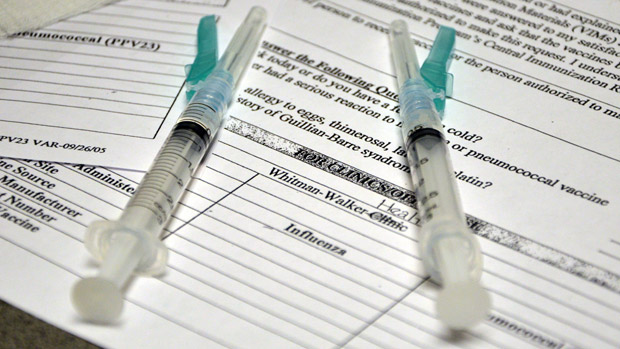Flu vaccine: who should get a flu jab this year?
The NHS says vulnerable people should get a flu vaccine before winter sets in

A free daily email with the biggest news stories of the day – and the best features from TheWeek.com
You are now subscribed
Your newsletter sign-up was successful
Catching flu is unpleasant for everyone, but for some people, such as pregnant women or those over the age of 65, the illness can have serious consequences.
A vaccination against the illness, commonly known as the "flu jab", is available every year on the NHS to protect people who are at risk of flu and its complications. So who should get it?
What is flu?
The Week
Escape your echo chamber. Get the facts behind the news, plus analysis from multiple perspectives.

Sign up for The Week's Free Newsletters
From our morning news briefing to a weekly Good News Newsletter, get the best of The Week delivered directly to your inbox.
From our morning news briefing to a weekly Good News Newsletter, get the best of The Week delivered directly to your inbox.
Flu, or influenza, is an infectious viral illness spread by coughs and sneezes. Flu symptoms come on very suddenly and usually include some combination of fever, chills, aching muscles and headaches. Flu can also cause feelings of nausea, tiredness and a sore throat.
Flu symptoms are usually felt within a day or two of infection and will be at their worst for two or three days. For most people, the illness will clear up after about a week, but in the UK around 600 people die each year from a complication of flu.
Who should get a flu jab?
Vaccination against the flu is now commonplace in the UK and is recommended for a broad range of people. For many of them it is free on the NHS.
A free daily email with the biggest news stories of the day – and the best features from TheWeek.com
This year all children between the ages of two and four are being offered an injection-free vaccination, in a move designed to prevent the spread of the illness through groups of children and families.
Nick Phin, head of respiratory diseases at Public Health England told the Daily Telegraph: "Vaccination interrupts the spread of flu providing indirect protection to those most vulnerable including the elderly and anyone with an underlying health condition."
The NHS advises that the following groups of people should vaccinate themselves:
- Those with a serious heart complaint
- People with a chest complaint or breathing difficulties, including asthma, bronchitis and emphysema
- Anyone suffering from serious kidney disease
- Those with diabetes
- Anyone suffering from any type of lowered immunity due to disease or treatment such as steroid medication or cancer treatment
- People who have previously had a stroke
- Anyone who has had a problem with their spleen who have had their spleen removed
- Healthy children aged two, three and four.
The NHS offers flu jabs for free to all adults over the age of 18 who are at risk of flu, which includes everyone over the age of 65, and children aged six months to two years at risk of flu. Children will generally be administered a nasal spray vaccine instead of an injection.
To find out if you are eligible for a free flu vaccination, click here.
What should you do if you get the flu?
If you are fairly fit and healthy then the NHS advises that there is generally no need to see a doctor. The best thing to do to treat the illness is to drink a lot of water to avoid dehydration, keep warm and rest at home. High temperatures and aches and pains can be treated with paracetamol or ibuprofen.
People suffering from flu-like symptoms are advised to see their doctor if they:
- Are aged 65 or over
- Are pregnant
- Have a long-term medical condition such as diabetes, heart disease, lung disease, kidney disease or a neurological disease
- Have a weakened immune system
Is prevention better than a cure?
Professor Dame Sally Davies, the Chief Medical Officer for England, said: "Flu is a really unpleasant illness, particularly for our most vulnerable patients and it is essential that people take steps to protect themselves during the winter months.
"I would urge those who are offered the free flu vaccination to visit their GP early in the flu season. I also urge all health care workers to make they are vaccinated to protect themselves, their patients and their families."
-
 The week’s best photos
The week’s best photosIn Pictures An explosive meal, a carnival of joy, and more
-
 The ‘ravenous’ demand for Cornish minerals
The ‘ravenous’ demand for Cornish mineralsUnder the Radar Growing need for critical minerals to power tech has intensified ‘appetite’ for lithium, which could be a ‘huge boon’ for local economy
-
 Why are election experts taking Trump’s midterm threats seriously?
Why are election experts taking Trump’s midterm threats seriously?IN THE SPOTLIGHT As the president muses about polling place deployments and a centralized electoral system aimed at one-party control, lawmakers are taking this administration at its word